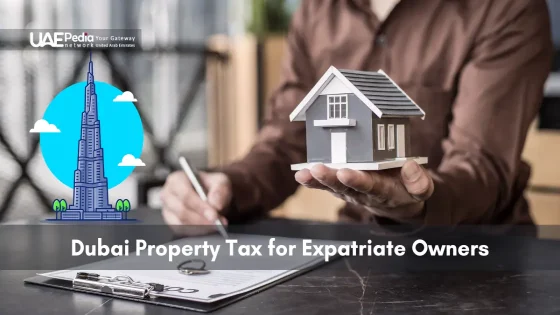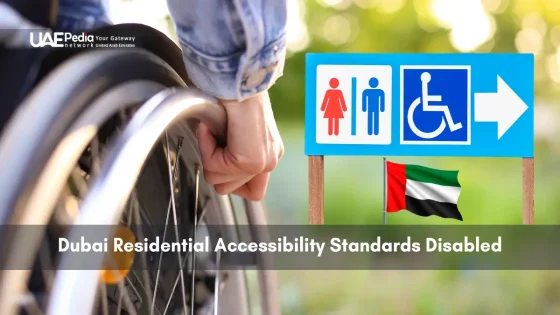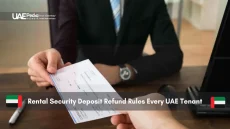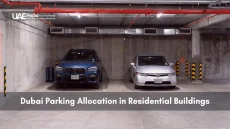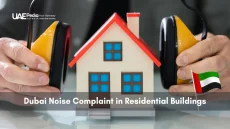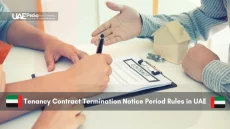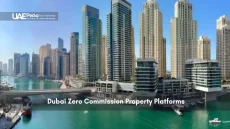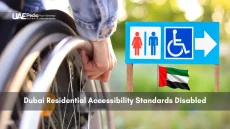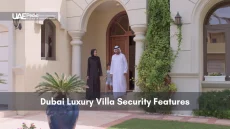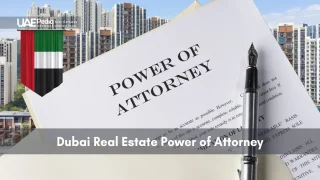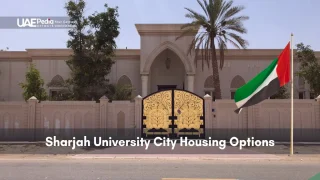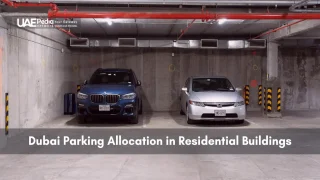What if owning real estate in one of the world’s most dynamic cities came with simpler financial rules than you’d expect? Unlike many global hubs, the UAE operates without standard annual levies on residential holdings—a detail that reshapes how expats approach investments here.
Navigating the system requires understanding a few key fees. The Dubai Land Department charges a one-time 4% transfer fee during sales, and some communities add service charges for amenities. But here’s the golden detail: no personal income tax means your earnings stay yours, whether from rentals or capital growth.
Digital tools now streamline payment tracking, letting owners manage obligations from anywhere. Whether you’re eyeing a sleek downtown apartment or a villa in a family-friendly zone, this tax-friendly landscape rewards strategic planning.
The UAE does not impose recurring property taxes on residential ownership; instead, buyers and sellers incur a one-time 4 percent transfer fee administered by the Dubai Land Department, with some developments levying annual service charges to cover shared-amenity maintenance. There is no personal income tax or capital gains tax on rental earnings or resale profits, which preserves the full yield of an investment. Freehold zones grant expatriates equivalent ownership rights to global standards, and digital platforms—such as the DLD portal and developer-provided dashboards—enable remote payment processing and real-time compliance tracking.
Practical application of this framework requires monitoring transaction deadlines and community fee schedules via official apps and developer systems. Service charges typically range from AED 10–30 per square foot annually, funding facilities rather than government revenue, while registration processes can be completed electronically within stipulated timeframes. By leveraging these streamlined tools, investors can efficiently manage obligations, reinvest realized savings, and maintain oversight of expenses without reliance on traditional taxation mechanisms.
Quick takeaways:
- Annual property taxes don’t exist here—but one-time fees apply during transactions.
- Freehold areas offer expats full ownership rights, aligning with global standards.
- Transparent digital systems simplify compliance, even for overseas investors.
Absence of annual property tax ensures expats retain 100% of their rental and resale income. Ref.: “V.L. Hendrickson. (2021). What Property Taxes Do Expats Pay for Owning in Dubai?. Mansion Global.” [!]
Understanding the UAE Real Estate Tax Landscape for Expatriates
Imagine a place where palm-lined communities thrive without yearly levies on homes—welcome to the Emirates. Unlike most global markets, this region replaces traditional annual taxes with straightforward transactional costs. Let’s unpack how it works.
Where Fees Replace Annual Burdens
Here’s the twist: the UAE skips recurring property taxes entirely. Instead, you’ll encounter a 4% transfer fee during sales—split equally between buyer and seller. Communities like Dubai Marina add annual service fees (averaging AED 12–25 per square foot) for shared amenities like pools and security. These charges fund maintenance, not government coffers.
Dubai Land Department imposes a one-time 4% transfer fee on each property transaction, replacing annual levies. Ref.: “Marta Savenko. (2023). Real Estate Taxes in the UAE: Which Taxes Apply?. Housearch.” [!]
Global Contrasts That Surprise
Compare this to the U.S., where annual rates average 1.1% of a home’s value, or France’s complex taxe foncière. One expat investor notes: “In London, my rental income gets sliced by 20%—here, it stays whole.” The UAE’s model prioritizes long-term ownership, with no capital gains tax on resale profits.
Digital portals like the DLD app streamline payments, turning what could be paperwork chaos into a five-minute task. Whether you’re eyeing a high-rise or a beachfront villa, this system rewards savvy planning. Ready to dive deeper into regulations? Let’s explore what comes next.
Navigating Dubai Property Tax for Expatriate Owners: What Expat Investors Need to Know
In a city known for its shimmering skyline, the financial rules for securing your slice of the market feel refreshingly straightforward. Let’s map out what you need to know before signing on the dotted line.
Key Tax Rules and Regulations
Transactions here come with clear upfront costs. The Dubai Land Department charges a 4% transfer fee split between buyer and seller—no hidden surprises. Recent updates now allow partial fee payments through their app, a game-changer for overseas investors. One satisfied buyer puts it best: “The DLD portal turned what I feared would be paperwork chaos into a 10-minute task.”
Three non-negotiable rules every investor should bookmark:
- Registration fees (2% of purchase price) paid within 30 days of agreement
- Annual community charges covering security and amenities
- Mandatory compliance checks for off-plan purchases
| Fee Type | Local Rate | New York Comparison | London Comparison |
|---|---|---|---|
| Transfer Fee | 4% | 1.825% | 3-5% |
| Annual Tax | 0% | 0.9-2.5% | Council Tax (£1k-3k) |
| Registration | 2% | 0.5-1% | 0.1-3.5% |
Pro tip: Set calendar reminders for payment deadlines and use government-approved valuation tools to avoid overpaying. With digital platforms handling most heavy lifting, you’re free to focus on finding that perfect beachfront balcony or family-friendly garden.
Using DLD’s smart remote payment services via Dubai Pay portal, Dubai Now app, or Noqodi wallet eliminates in-person visits and speeds up registration. Ref.: “Dubai Land Department. (2020). DLD: Smart remote payment services to facilitate real estate registration process. Dubai Land Department.” [!]
Exploring UAE Tax Regulations and Their Implications on Property Ownership
When navigating the UAE’s financial landscape, it’s like discovering two layers of a treasure map—federal guidelines set the boundaries, while local rules add the X-marks-the-spot details. Let’s decode how these layers shape your investment journey.
Federal Policies vs. Local Requirements
The UAE’s federal framework eliminates personal income tax nationwide—a golden rule that applies equally in Abu Dhabi’s cultural districts and Dubai’s business hubs. But local municipalities add their own twists. Service charges for community pools or security? Those vary by neighborhood, not national law.
Consider this comparison:
| Fee Type | Federal Policy | Local Variation | Example |
|---|---|---|---|
| Income Tax | 0% nationwide | N/A | Applies uniformly |
| Registration | No federal fee | 2-4% locally | Dubai vs. Sharjah |
| Service Charges | Not regulated | Set by developers | Palm Jumeirah rates |
Benefits of the No Personal Income Tax Regime
Here’s why expats cheer: rental profits and resale gains stay entirely in your pocket. A New York-based investor turned UAE resident puts it best: “Keeping 100% of my earnings lets me upgrade my portfolio twice as fast.”
Three smart moves for aligning your strategy:
- Track community-specific fees through developer portals
- Use the UAE property owner visa for long-term stays
- Reinvest saved tax funds into property upgrades
These policies create a sandbox for growth—whether you’re leasing a downtown studio or holding a beachfront villa. Ready to explore how digital tools simplify compliance? Let’s dive into the tech side next.
Read More:
The Role of the Dubai Land Department in Tax Registration and Property Transfers
Ever wondered how a single agency keeps Dubai’s booming real estate market running like clockwork? Meet the Dubai Land Department (DLD)—your digital-first partner in navigating transfers and registrations. Their systems turn complex processes into tap-and-go convenience.
Understanding DLD Transfer Fees
Here’s the deal: when buying or selling, you’ll encounter a 4% transfer fee. This gets split evenly between both parties—no haggling required. For a AED 2 million condo, that’s AED 40,000 each. Unlike recurring taxes elsewhere, this one-time charge keeps long-term costs predictable.
Administrative Steps and Digital Solutions
The DLD’s app transforms paperwork marathons into 15-minute tasks. Upload documents, pay fees, and track progress—all from your phone. One investor shared: “Last year, I closed a deal while hiking in Colorado. The system works smoother than my coffee order!”
Three reasons tech-savvy investors love this approach:
- Real-time payment confirmations prevent delays
- Digital ownership certificates replace bulky files
- Automated reminders for contract deadlines
Whether you’re trading skyscraper penthouses or suburban townhouses, these tools make compliance feel effortless. Ready to explore how exemptions sweeten the deal? Let’s uncover hidden perks next.
Tax Exemptions and Incentives for Property Investors in the United Arab Emirates
Picture opening a treasure chest where every gold coin represents a fiscal advantage—this mirrors the UAE’s approach to rewarding savvy portfolio builders. Let’s explore how strategic planning here keeps more profits in your pocket.
Corporate Advantages That Spark Growth
Businesses structuring investments through UAE entities enjoy a 9% rate on annual profits exceeding AED 375,000. Below that threshold? Zero. Compare this to Germany’s 30% corporate rate or Singapore’s 17%. One tech entrepreneur relocated from California shares: “Keeping 91% of my profits above the threshold lets me expand operations twice as fast.”
The Golden Rule of Zero Capital Gains
Whether you’re flipping condos or holding commercial spaces for decades, resale profits remain untouched. Sell a Palm Jumeirah unit for AED 5 million more than purchase price? That extra million stays entirely yours. This policy reshapes retirement strategies—many reinvest saved taxes into additional holdings.
| Benefit | UAE | USA | UK |
|---|---|---|---|
| Corporate Tax Rate | 0-9% | 21% federal | 19-25% |
| Capital Gains Tax | 0% | 0-20% | 18-28% |
| Dividend Withholding | 0% | 30% | 0% |
Three smart moves for leveraging these perks:
- Structure holdings through free zones for optimized tax treatment
- Reinvest saved capital gains into market-responsive upgrades
- Use government portals to track exemption eligibility in real-time
With digital dashboards now simplifying compliance, your focus stays on growth—not paperwork. Ready to see how these advantages compound over time? Let’s chart your next move.
Failure to settle DLD property registration fees within 60 days can incur penalties and legal violations. Ref.: “Mansoor Zain Alsharif. (2021). DLD calls on developers to pay property registration fees within 60 days. Dubai Land Department News & Media.” [!]
Analyzing Annual Service Charges, VAT, and Additional Property Costs
Think of your recurring expenses like a well-oiled machine—predictable parts working in sync. While upfront fees grab headlines, smart investors know the real game lies in mastering ongoing costs. Let’s demystify these essentials.
Residential Service Charges Explained
Community fees keep shared spaces sparkling—think pools, gyms, and landscaping. Rates typically range from AED 10 to AED 30 per square foot annually. A 1,500 sq.ft. apartment in a mid-tier community? That’s AED 30,000 yearly. “These charges aren’t taxes,” clarifies a Jumeirah-based manager. “They’re maintenance funds managed by your building’s owners’ association.”
VAT on Commercial Properties and Municipal Fees
Business spaces operate differently. A 5% VAT applies to commercial leases and sales—add AED 25,000 to a AED 500,000 office rental. Municipal fees add another layer: 5% of annual rent for residential units. Renting out a villa for AED 100,000/year? Budget AED 5,000 extra.
| Expense Type | Residential | Commercial |
|---|---|---|
| Service Charges | AED 10-30/sq.ft. | N/A |
| VAT | 0% | 5% |
| Municipal Fees | 5% of rent | Varies by emirate |
Three budgeting hacks from seasoned owners:
- Use developer portals to track payment deadlines
- Set aside 8-12% of rental income for unexpected repairs
- Review service charge breakdowns annually—question unclear line items
Digital tools like Bayut or Dubizzle automate reminders, turning financial management into a background task. One Sharjah resident shares: “My app pings me two weeks before each payment—no more late fees!” Regular check-ups keep your investment humming smoothly.
Embracing Digital Transformation in Property Management and Tax Compliance
Imagine managing your overseas investments from a beach in Bali while your phone pings with automated payment confirmations. The UAE’s real estate sector now operates on digital rails—turning complex financial tracking into something as simple as ordering groceries online.
Streamlined Management Through Software
Modern platforms like Bayut Pro and Dubizzle Dashboard auto-calculate service charges based on square footage. One investor shares: “My maintenance fees now land in my inbox pre-calculated—no more spreadsheet Sundays.” These tools generate instant reports for community fees, lease renewals, and compliance deadlines.
Automated Payment and Record-Keeping Solutions
Digital systems send alerts 72 hours before payments are due. Miss a deadline? The app nudges you with escalating reminders. Real-time dashboards show:
- Historical payment patterns
- Upcoming tax-related deadlines
- Maintenance request statuses
For expats, this means fewer panicked calls to accountants. As one tech-savvy owner notes: “I reclaimed 10 hours monthly just by automating document storage.” The United Arab Emirates’ push for paperless governance makes these tools both powerful and necessary.
Newcomers needn’t fear the learning curve—most platforms offer guided onboarding tours. Ready to swap file cabinets for cloud storage? Your future self (and your portfolio) will thank you.
Legal Documentation and Due Diligence in Dubai Property Transactions
Ever felt like legal paperwork could use a GPS? In the UAE’s real estate maze, the right documents act as your North Star—guiding you past hidden cliffs toward smooth ownership. Let’s unpack the essentials that keep your investment journey on course.
Reviewing Sale and Purchase Agreements (SPA)
An SPA isn’t just paperwork—it’s your financial shield. Key clauses to spotlight:
- Payment timelines (deposits vs. final transfers)
- Penalties for delays by either party
- Inclusions like parking spots or furniture
One buyer learned the hard way: “Our SPA didn’t specify balcony rights—cost us AED 50k in revisions.” Always cross-check floor plans against listed square footage.
Ensuring Compliance with Regulatory Bodies
RERA and the land department set the playbook. Their portals verify:
- Developer licenses (avoid off-plan nightmares)
- Title deed authenticity (scan QR codes)
- Service charge histories (no surprise fees)
A quick checklist for newcomers:
- Hire a RERA-certified lawyer—they speak the local legal dialect
- Request Oqood certificates for off-plan units
- Confirm no pending violations on existing structures
Digital tools like the DLD app now flag discrepancies in real-time. As one investor quips: “It’s like having a co-pilot who never blinks.” With every signature, you’re not just buying space—you’re securing peace of mind.
Investment Insights: Planning, Budgeting, and Estate Considerations for Expats
Picture your investment journey as a desert road trip—sunlit opportunities ahead, but smart travelers always pack extra water for hidden dunes. Let’s map out how to navigate financial planning without surprises.
Budgeting for Hidden Costs and Maintenance Fees
Even in regions with no annual levies, smart budgeting matters. Service charges for amenities like gyms or landscaping average AED 15–30 per square foot yearly. For a 1,200 sq.ft. apartment, that’s AED 18,000–36,000 annually. “I set aside 10% of rental income for unexpected repairs,” shares a JBR-based investor. “Last year’s AC replacement? Covered without stress.”
| Expense | Typical Cost (AED) | New York Equivalent | London Equivalent |
|---|---|---|---|
| Annual Service Fees | 15,000–50,000 | $4,800–12,000 | £3,000–7,000 |
| Emergency Fund | 8–12% of rent | 10–15% | 10–15% |
| Valuation Reports | 2,500–5,000 | $300–800 | £250–600 |
Strategic Long-Term Investment Planning
Zero capital gains tax transforms exit strategies. Reinvesting profits into additional units compounds growth—one owner turned two condos into five over eight years. Digital tools like estate management apps track market trends and automate savings goals.
Three steps to future-proof your portfolio:
- Allocate 15% monthly income to a dedicated maintenance account
- Use government valuation portals before renewing leases
- Update inheritance documents annually through legal portals
With cloud-based platforms simplifying compliance, your focus stays on growth—not spreadsheets. Ready to turn insights into action? Your roadmap to confident investing starts now.
Check out the below:
Final Thoughts on Smart Property Tax Management for Expatriate Owners
Building wealth through real estate here doesn’t require a decoder ring—just clarity on a few smart strategies. The UAE’s approach turns potential headaches into opportunities, with zero annual levies and straightforward transactional costs. Digital tools like government portals and automated payment systems keep compliance simple, even from overseas.
Key takeaways? Keep earnings from rentals and sales entirely yours, thanks to no personal income or capital gains rules. Service charges and one-time fees remain predictable when using apps that track deadlines. Combine this with expert legal guidance, and you’ve got a recipe for stress-free growth.
Smart investors pair these benefits with proactive planning: setting aside funds for maintenance, reinvesting profits, and staying updated on local regulations. Whether you’re managing a studio or a villa, the system rewards those who plan ahead.
Ready to dive deeper? Explore our guides on uaepedia.net for step-by-step tips. Your journey toward confident investing starts with knowing the rules—and using them to your advantage.
No annual property taxes apply to residential ownership. However, owners pay service charges (AED 8–25 per sqft/year) for community upkeep and municipal fees (5% of rental value if leased).
Dubai’s 4% transfer fee (split between buyer/seller) is lower than cities like London (up to 12% stamp duty) or Singapore (up to 6%). Abu Dhabi charges 2%, making the Emirates competitive for investors.
VAT generally applies at 5% for commercial properties and hotel apartments. Businesses registered for VAT can reclaim these costs if they meet Federal Tax Authority criteria—consult a tax advisor for eligibility.
The Dubai Land Department’s ‘Dubai REST’ app handles fee payments, document tracking, and contract renewals. Emirates Real Estate Solutions (ERES) software also automates service charge calculations and compliance reports.
Assets fall under UAE Sharia law unless specified in a will registered with Dubai Courts or DIFC Wills Service. Drafting a region-specific estate plan prevents legal complexities for heirs.
Yes—developers may impose AED 500–1,000 fines monthly after 30-day grace periods. Persistent delays can lead to DEWA utility disconnections or access restrictions in gated communities.
All freehold zones (Palm Jumeirah, Downtown Dubai, etc.) follow federal tax rules. However, some provide extended utility subsidies or reduced registration fees during promotional periods—check RERA bulletins for updates.
